
Blog (871)
Reducing Inflammation in Arthritic Feet
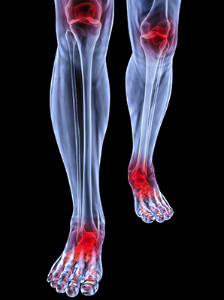 Arthritis is a very common disease that can affect joints in areas all over the body. Arthritis of the feet can be especially painful and debilitating due to the constant weight put on that section of the body. For someone with arthritic feet, every step taken can be excruciating. There are many different types of arthritis, though inflammatory arthritis can be one of the most devastating. Rheumatoid arthritis is one such type, where the cartilage of the joints is being destroyed. Though there is really no set diet to cure this illness, there are some recommended foods that may prove effective in helping mitigate some of the arthritic symptoms. The key is to reduce inflammation. Certain foods that help do just that are nuts, fish, and, dark vegetables.
Arthritis is a very common disease that can affect joints in areas all over the body. Arthritis of the feet can be especially painful and debilitating due to the constant weight put on that section of the body. For someone with arthritic feet, every step taken can be excruciating. There are many different types of arthritis, though inflammatory arthritis can be one of the most devastating. Rheumatoid arthritis is one such type, where the cartilage of the joints is being destroyed. Though there is really no set diet to cure this illness, there are some recommended foods that may prove effective in helping mitigate some of the arthritic symptoms. The key is to reduce inflammation. Certain foods that help do just that are nuts, fish, and, dark vegetables.
Arthritis can be a difficult condition to live with. If you are seeking treatment, contact one of our podiatrists from Westland Foot & Ankle Specialists, P.C.. Our doctors can provide the care you need to keep you pain-free and on your feet.
Arthritic Foot Care
Arthritis is a joint disorder that involves the inflammation of different joints in your body, such as those in your feet. Arthritis is often caused by a degenerative joint disease and causes mild to severe pain in all affected areas. In addition to this, swelling and stiffness in the affected joints can also be a common symptom of arthritis.
In many cases, wearing ill-fitting shoes can worsen the effects and pain of arthritis. Wearing shoes that have a lower heel and extra room can help your feet feel more comfortable. In cases of rheumatoid arthritis, the arch in your foot may become problematic. Buying shoes with proper arch support that contour to your feet can help immensely.
Alleviating Arthritic Pain
- Exercises that stretch the foot can prevent further pain and injury and increase mobility
- Most of the pain can be alleviated with anti-inflammatory drugs, heat, and topical medications
- Massages can help temporarily alleviate pain.
It is best to see your doctor for the treatment that is right for your needs and symptoms. Conditions vary, and a podiatrist can help you determine the right method of care for your feet.
If you have any questions, please feel free to contact our office located in Westland, MI. . We offer the newest diagnostic tools and technology to treat your foot and ankle needs.
Lupus in the Feet
 Known as a chronic autoimmune disease, lupus and its symptoms are similar to that of arthritis, affecting the tissues in the joints and leading to various problems in the feet including bunions, claw toes, and hammertoes. Lupus can also lead to tendonitis, loss of feeling or neuropathy, muscle inflammation, corns and calluses, swollen feet or oedema, and more. It is especially important to watch lupus symptoms, as infections such as gangrene can develop in a healthy person. Visit your podiatrist to assess your condition, as well as invest in proper footwear with insoles.
Known as a chronic autoimmune disease, lupus and its symptoms are similar to that of arthritis, affecting the tissues in the joints and leading to various problems in the feet including bunions, claw toes, and hammertoes. Lupus can also lead to tendonitis, loss of feeling or neuropathy, muscle inflammation, corns and calluses, swollen feet or oedema, and more. It is especially important to watch lupus symptoms, as infections such as gangrene can develop in a healthy person. Visit your podiatrist to assess your condition, as well as invest in proper footwear with insoles.
When dealing with systemic disease of the feet, it is extremely important to check the affected areas routinely so that any additional problems are caught quickly. If you have any concerns about your feet and ankles contact one of our podiatrists from Dr. Kane & Associates, P.C. Our doctors will assist you with all of your podiatric needs.
Systemic Diseases of the Feet
Systemic diseases affect the whole body, and symptoms usually are displayed in the feet. This condition can make a patient’s ability to walk unbearable. Systemic diseases include gout, diabetes mellitus, neurological disorders, and arthritis.
Gout – is caused by an excess of uric acid in the body. Common symptoms include pain, inflammation, and redness at the metatarsal/phalangeal joint of the base big toe. Gout can be treated by NSAIDs to relieve pain and inflammation, and other drugs that lower the acid levels in the body.
Diabetes mellitus – is an increase in the level of blood sugar that the body cannot counteract with its own insulin. Failure to produce enough insulin is a factor in Diabetes.
Diabetes of the Feet
Diabetic Neuropathy – may lead to damaged nerves and affect the feet through numbness and loss of sensation.
Peripheral Vascular Disease – can restrict the blood flow to the feet, and often times lead to amputation of the feet.
If you have any questions please feel free to contact our office located in Westland, MI.. We offer the newest diagnostic and treatment technologies for all your foot and ankle needs.
Read more about Systemic Diseases of the FootLupus in the Feet
 Known as a chronic autoimmune disease, lupus and its symptoms are similar to that of arthritis, affecting the tissues in the joints and leading to various problems in the feet including bunions, claw toes, and hammertoes. Lupus can also lead to tendonitis, loss of feeling or neuropathy, muscle inflammation, corns and calluses, swollen feet or oedema, and more. It is especially important to watch lupus symptoms, as infections such as gangrene can develop in a healthy person. Visit your podiatrist to assess your condition, as well as invest in proper footwear with insoles.
Known as a chronic autoimmune disease, lupus and its symptoms are similar to that of arthritis, affecting the tissues in the joints and leading to various problems in the feet including bunions, claw toes, and hammertoes. Lupus can also lead to tendonitis, loss of feeling or neuropathy, muscle inflammation, corns and calluses, swollen feet or oedema, and more. It is especially important to watch lupus symptoms, as infections such as gangrene can develop in a healthy person. Visit your podiatrist to assess your condition, as well as invest in proper footwear with insoles.
When dealing with systemic disease of the feet, it is extremely important to check the affected areas routinely so that any additional problems are caught quickly. If you have any concerns about your feet and ankles contact one of our podiatrists from Westland Foot & Ankle Specialists, P.C.. Our doctors will assist you with all of your podiatric needs.
Systemic Diseases of the Feet
Systemic diseases affect the whole body, and symptoms usually are displayed in the feet. This condition can make a patient’s ability to walk unbearable. Systemic diseases include gout, diabetes mellitus, neurological disorders, and arthritis.
Gout – is caused by an excess of uric acid in the body. Common symptoms include pain, inflammation, and redness at the metatarsal/phalangeal joint of the base big toe. Gout can be treated by NSAIDs to relieve pain and inflammation, and other drugs that lower the acid levels in the body.
Diabetes mellitus – is an increase in the level of blood sugar that the body cannot counteract with its own insulin. Failure to produce enough insulin is a factor in Diabetes.
Diabetes of the Feet
Diabetic Neuropathy – may lead to damaged nerves and affect the feet through numbness and loss of sensation.
Peripheral Vascular Disease – can restrict the blood flow to the feet, and often times lead to amputation of the feet.
If you have any questions please feel free to contact our office located in Westland, MI. . We offer the newest diagnostic and treatment technologies for all your foot and ankle needs.
Choosing the Right Winter Footwear for Bunions
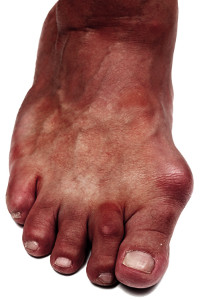 As the winter months are here, you may find yourself switching to winter shoes such as boots. However, it’s important to be mindful that boots are often narrow and can irritate bunions. Bunions are bony protrusions on the side of the feet that develop over time. Narrow shoes such as winter boots can contribute to the progression of this condition, so it’s vital to accommodate your feet with the proper footwear. Opt for wide shoes and look to treatment options such as orthotics, padding, and if the condition is severe, anti-inflammatory medications, injections, or surgery.
As the winter months are here, you may find yourself switching to winter shoes such as boots. However, it’s important to be mindful that boots are often narrow and can irritate bunions. Bunions are bony protrusions on the side of the feet that develop over time. Narrow shoes such as winter boots can contribute to the progression of this condition, so it’s vital to accommodate your feet with the proper footwear. Opt for wide shoes and look to treatment options such as orthotics, padding, and if the condition is severe, anti-inflammatory medications, injections, or surgery.
If you are suffering from bunions, contact one of our podiatrists of Dr. Kane & Associates, P.C. Our doctors can provide the care you need to keep you pain-free and on your feet.
What Is a Bunion?
A bunion is formed of swollen tissue or an enlargement of boney growth, usually located at the base joint of the toe that connects to the foot. The swelling occurs due to the bones in the big toe shifting inward, which impacts the other toes of the foot. This causes the area around the base of the big toe to become inflamed and painful.
Why Do Bunions Form?
Genetics – Susceptibility to bunions are often hereditary
Stress on the feet – Poorly fitted and uncomfortable footwear that places stress on feet, such as heels, can worsen existing bunions
How Are Bunions Diagnosed?
Doctors often perform two tests – blood tests and x-rays – when trying to diagnose bunions, especially in the early stages of development. Blood tests help determine if the foot pain is being caused by something else, such as arthritis, while x-rays provide a clear picture of your bone structure to your doctor.
How Are Bunions Treated?
- Refrain from wearing heels or similar shoes that cause discomfort
- Select wider shoes that can provide more comfort and reduce pain
- Anti-inflammatory and pain management drugs
- Orthotics or foot inserts
- Surgery
If you have any questions, please feel free to contact our office located in Westland, MI.. We offer the newest diagnostic and treatment technologies for all your foot care needs.
Read more about BunionsChoosing the Right Winter Footwear for Bunions
 As the winter months are here, you may find yourself switching to winter shoes such as boots. However, it’s important to be mindful that boots are often narrow and can irritate bunions. Bunions are bony protrusions on the side of the feet that develop over time. Narrow shoes such as winter boots can contribute to the progression of this condition, so it’s vital to accommodate your feet with the proper footwear. Opt for wide shoes and look to treatment options such as orthotics, padding, and if the condition is severe, anti-inflammatory medications, injections, or surgery.
As the winter months are here, you may find yourself switching to winter shoes such as boots. However, it’s important to be mindful that boots are often narrow and can irritate bunions. Bunions are bony protrusions on the side of the feet that develop over time. Narrow shoes such as winter boots can contribute to the progression of this condition, so it’s vital to accommodate your feet with the proper footwear. Opt for wide shoes and look to treatment options such as orthotics, padding, and if the condition is severe, anti-inflammatory medications, injections, or surgery.
If you are suffering from bunions, contact one of our podiatrists of Westland Foot & Ankle Specialists, P.C.. Our doctors can provide the care you need to keep you pain-free and on your feet.
What Is a Bunion?
A bunion is formed of swollen tissue or an enlargement of boney growth, usually located at the base joint of the toe that connects to the foot. The swelling occurs due to the bones in the big toe shifting inward, which impacts the other toes of the foot. This causes the area around the base of the big toe to become inflamed and painful.
Why Do Bunions Form?
Genetics – Susceptibility to bunions are often hereditary
Stress on the feet – Poorly fitted and uncomfortable footwear that places stress on feet, such as heels, can worsen existing bunions
How Are Bunions Diagnosed?
Doctors often perform two tests – blood tests and x-rays – when trying to diagnose bunions, especially in the early stages of development. Blood tests help determine if the foot pain is being caused by something else, such as arthritis, while x-rays provide a clear picture of your bone structure to your doctor.
How Are Bunions Treated?
- Refrain from wearing heels or similar shoes that cause discomfort
- Select wider shoes that can provide more comfort and reduce pain
- Anti-inflammatory and pain management drugs
- Orthotics or foot inserts
- Surgery
If you have any questions, please feel free to contact our office located in Westland, MI. . We offer the newest diagnostic and treatment technologies for all your foot care needs.
How to Avoid Peripheral Neuropathy
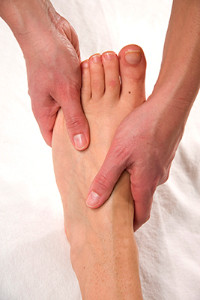 Peripheral neuropathy is a disorder that occurs frequently in diabetics, typically in the feet. The symptoms include: numbness, tingling, throbbing, freezing/burning sensation, and pain. Not all those with diabetes will get peripheral neuropathy, and not all suffering from it will have the exact same symptoms. This neuropathy occurs when the walls of the capillaries, or tiny blood vessels, are damaged by high sugar levels in the blood. Due to the damage they are not able to carry enough blood to the nerves, which then leads to the aforementioned symptoms. In order to avoid peripheral neuropathy there a few things that can be done. First, and perhaps most importantly, monitor your blood sugar level, and keep it in balance. Exercise and diet can help keep your weight down, as well as your blood sugar. If you are suffering from numbness in your feet, and you haven’t been diagnosed with diabetes, it is essential that you see a doctor immediately.
Peripheral neuropathy is a disorder that occurs frequently in diabetics, typically in the feet. The symptoms include: numbness, tingling, throbbing, freezing/burning sensation, and pain. Not all those with diabetes will get peripheral neuropathy, and not all suffering from it will have the exact same symptoms. This neuropathy occurs when the walls of the capillaries, or tiny blood vessels, are damaged by high sugar levels in the blood. Due to the damage they are not able to carry enough blood to the nerves, which then leads to the aforementioned symptoms. In order to avoid peripheral neuropathy there a few things that can be done. First, and perhaps most importantly, monitor your blood sugar level, and keep it in balance. Exercise and diet can help keep your weight down, as well as your blood sugar. If you are suffering from numbness in your feet, and you haven’t been diagnosed with diabetes, it is essential that you see a doctor immediately.
Diabetic foot care is important in preventing foot ailments such as ulcers. If you are suffering from diabetes or have any other concerns about your feet, contact one of our podiatrists from Dr. Kane & Associates, P.C. Our doctors can provide the care you need to keep you pain-free and on your feet.
Diabetic Foot Care
Diabetes affects millions of people every year. The condition can damage blood vessels in many parts of the body, especially the feet. Because of this, taking care of your feet is essential if you have diabetes, and having a podiatrist help monitor your foot health is highly recommended.
The Importance of Caring for Your Feet
- Routinely inspect your feet for bruises or sores.
- Wear socks that fit your feet comfortably.
- Wear comfortable shoes that provide adequate support.
Patients with diabetes should have their doctor monitor their blood levels, as blood sugar levels play such a huge role in diabetic care. Monitoring these levels on a regular basis is highly advised.
It is always best to inform your healthcare professional of any concerns you may have regarding your feet, especially for diabetic patients. Early treatment and routine foot examinations are keys to maintaining proper health, especially because severe complications can arise if proper treatment is not applied.
If you have any questions please feel free to contact our office located in Westland, MI.. We offer the newest diagnostic and treatment technologies for all your foot and ankle needs.
Read more about How to Care for Diabetic FootHow to Avoid Peripheral Neuropathy
 Peripheral neuropathy is a disorder that occurs frequently in diabetics, typically in the feet. The symptoms include: numbness, tingling, throbbing, freezing/burning sensation, and pain. Not all those with diabetes will get peripheral neuropathy, and not all suffering from it will have the exact same symptoms. This neuropathy occurs when the walls of the capillaries, or tiny blood vessels, are damaged by high sugar levels in the blood. Due to the damage they are not able to carry enough blood to the nerves, which then leads to the aforementioned symptoms. In order to avoid peripheral neuropathy there a few things that can be done. First, and perhaps most importantly, monitor your blood sugar level, and keep it in balance. Exercise and diet can help keep your weight down, as well as your blood sugar. If you are suffering from numbness in your feet, and you haven’t been diagnosed with diabetes, it is essential that you see a doctor immediately.
Peripheral neuropathy is a disorder that occurs frequently in diabetics, typically in the feet. The symptoms include: numbness, tingling, throbbing, freezing/burning sensation, and pain. Not all those with diabetes will get peripheral neuropathy, and not all suffering from it will have the exact same symptoms. This neuropathy occurs when the walls of the capillaries, or tiny blood vessels, are damaged by high sugar levels in the blood. Due to the damage they are not able to carry enough blood to the nerves, which then leads to the aforementioned symptoms. In order to avoid peripheral neuropathy there a few things that can be done. First, and perhaps most importantly, monitor your blood sugar level, and keep it in balance. Exercise and diet can help keep your weight down, as well as your blood sugar. If you are suffering from numbness in your feet, and you haven’t been diagnosed with diabetes, it is essential that you see a doctor immediately.
Diabetic foot care is important in preventing foot ailments such as ulcers. If you are suffering from diabetes or have any other concerns about your feet, contact one of our podiatrists from Westland Foot & Ankle Specialists, P.C.. Our doctors can provide the care you need to keep you pain-free and on your feet.
Diabetic Foot Care
Diabetes affects millions of people every year. The condition can damage blood vessels in many parts of the body, especially the feet. Because of this, taking care of your feet is essential if you have diabetes, and having a podiatrist help monitor your foot health is highly recommended.
The Importance of Caring for Your Feet
- Routinely inspect your feet for bruises or sores.
- Wear socks that fit your feet comfortably.
- Wear comfortable shoes that provide adequate support.
Patients with diabetes should have their doctor monitor their blood levels, as blood sugar levels play such a huge role in diabetic care. Monitoring these levels on a regular basis is highly advised.
It is always best to inform your healthcare professional of any concerns you may have regarding your feet, especially for diabetic patients. Early treatment and routine foot examinations are keys to maintaining proper health, especially because severe complications can arise if proper treatment is not applied.
If you have any questions please feel free to contact our office located in Westland, MI. . We offer the newest diagnostic and treatment technologies for all your foot and ankle needs.
Preventing Poor Blood Circulation
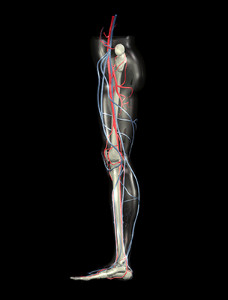 If your feet feel cold, especially during these winter months, it is because it is your body’s natural response for conserving heat when it is too cold. Your body “tries to maintain its internal temperature by constricting small blood vessels under the surface of the skin. This allows more blood to move deeper in the body, so your core stays warm.” However, this causes your body’s extremities, like the feet, to receive poor blood circulation. When taking care of your cold feet, try to wear warm, breathable socks that help wick away moisture. Opt for wool in place of cotton. Other methods include warming your feet up in warm water, drinking hot liquids, moving around to get your blood circulation going, and investing in shoe inserts to help insulate the insides of your shoes.
If your feet feel cold, especially during these winter months, it is because it is your body’s natural response for conserving heat when it is too cold. Your body “tries to maintain its internal temperature by constricting small blood vessels under the surface of the skin. This allows more blood to move deeper in the body, so your core stays warm.” However, this causes your body’s extremities, like the feet, to receive poor blood circulation. When taking care of your cold feet, try to wear warm, breathable socks that help wick away moisture. Opt for wool in place of cotton. Other methods include warming your feet up in warm water, drinking hot liquids, moving around to get your blood circulation going, and investing in shoe inserts to help insulate the insides of your shoes.
Poor circulation is a serious condition and needs immediate medical attention. If you have any concerns with poor circulation in your feet contact one of our podiatrists of Dr. Kane & Associates, P.C. Our doctors will treat your foot and ankle needs.
Poor Circulation in the Feet
Poor blood circulation in the feet and legs is can be caused by peripheral artery disease (PAD), which is the result of a buildup of plaque in the arteries.
Plaque buildup or atherosclerosis results from excess calcium and cholesterol in the bloodstream. This can restrict the amount of blood which can flow through the arteries. Poor blood circulation in the feet and legs are sometimes caused by inflammation in the blood vessels, known as vasculitis.
Causes
Lack of oxygen and oxygen from poor blood circulation restricts muscle growth and development. It can also cause:
- Muscle pain, stiffness, or weakness
- Numbness or cramping in the legs
- Skin discoloration
- Slower nail & hair growth
- Erectile dysfunction
Those who have diabetes or smoke are at greatest risk for poor circulation, as are those who are over 50. If you have poor circulation in the feet and legs it may be caused by PAD and is important to make changes to your lifestyle in order to reduce risk of getting a heart attack or stroke. Exercise and maintaining a healthy lifestyle will dramatically improve conditions.
As always, see a podiatrist as he or she will assist in finding a regimen that suits you. A podiatrist can also prescribe you any needed medication.
If you have any questions please feel free to contact our office located in Westland, MI.. We offer the newest diagnostic and treatment technologies for all your foot and ankle needs.
Read more about Causes, Symptoms, and Treatment of Poor Blood Circulation in the FeetPreventing Poor Blood Circulation
 If your feet feel cold, especially during these winter months, it is because it is your body’s natural response for conserving heat when it is too cold. Your body “tries to maintain its internal temperature by constricting small blood vessels under the surface of the skin. This allows more blood to move deeper in the body, so your core stays warm.” However, this causes your body’s extremities, like the feet, to receive poor blood circulation. When taking care of your cold feet, try to wear warm, breathable socks that help wick away moisture. Opt for wool in place of cotton. Other methods include warming your feet up in warm water, drinking hot liquids, moving around to get your blood circulation going, and investing in shoe inserts to help insulate the insides of your shoes.
If your feet feel cold, especially during these winter months, it is because it is your body’s natural response for conserving heat when it is too cold. Your body “tries to maintain its internal temperature by constricting small blood vessels under the surface of the skin. This allows more blood to move deeper in the body, so your core stays warm.” However, this causes your body’s extremities, like the feet, to receive poor blood circulation. When taking care of your cold feet, try to wear warm, breathable socks that help wick away moisture. Opt for wool in place of cotton. Other methods include warming your feet up in warm water, drinking hot liquids, moving around to get your blood circulation going, and investing in shoe inserts to help insulate the insides of your shoes.
Poor circulation is a serious condition and needs immediate medical attention. If you have any concerns with poor circulation in your feet contact one of our podiatrists of Westland Foot & Ankle Specialists, P.C.. Our doctors will treat your foot and ankle needs.
Poor Circulation in the Feet
Poor blood circulation in the feet and legs is can be caused by peripheral artery disease (PAD), which is the result of a buildup of plaque in the arteries.
Plaque buildup or atherosclerosis results from excess calcium and cholesterol in the bloodstream. This can restrict the amount of blood which can flow through the arteries. Poor blood circulation in the feet and legs are sometimes caused by inflammation in the blood vessels, known as vasculitis.
Causes
Lack of oxygen and oxygen from poor blood circulation restricts muscle growth and development. It can also cause:
- Muscle pain, stiffness, or weakness
- Numbness or cramping in the legs
- Skin discoloration
- Slower nail & hair growth
- Erectile dysfunction
Those who have diabetes or smoke are at greatest risk for poor circulation, as are those who are over 50. If you have poor circulation in the feet and legs it may be caused by PAD and is important to make changes to your lifestyle in order to reduce risk of getting a heart attack or stroke. Exercise and maintaining a healthy lifestyle will dramatically improve conditions.
As always, see a podiatrist as he or she will assist in finding a regimen that suits you. A podiatrist can also prescribe you any needed medication.
If you have any questions please feel free to contact our office located in Westland, MI. . We offer the newest diagnostic and treatment technologies for all your foot and ankle needs.
Causes of Plantar Fasciitis
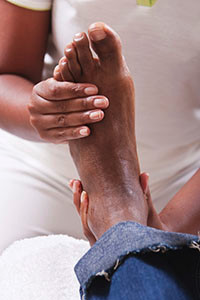 If you are experiencing moderate to severe pain in your heel or foot, you may have Plantar Fasciitis. Plantar Fasciitis is an inflammatory condition that affects the heel of the foot, causing in some cases, very extreme pain. There are many causes for this, one being overstretching of the plantar fascia ligament, which runs from the heel to the ball of the foot. This ligament supports the arch and can be affected by both the feet below it, and the muscles above. If the calf muscles are too tight, this can pull on the ligament and cause inflammation. A similar thing happens if you have flat feet. The foot stretches the ligament from below. Other activities that can cause Plantar Fasciitis are standing for long periods of time, running while planting your heel instead of your toe, and constant stress on the plantar fascia ligament. Make sure to stretch your calves, take care that your footwear is not worn out, and seek podiatric treatment if your condition is painful.
If you are experiencing moderate to severe pain in your heel or foot, you may have Plantar Fasciitis. Plantar Fasciitis is an inflammatory condition that affects the heel of the foot, causing in some cases, very extreme pain. There are many causes for this, one being overstretching of the plantar fascia ligament, which runs from the heel to the ball of the foot. This ligament supports the arch and can be affected by both the feet below it, and the muscles above. If the calf muscles are too tight, this can pull on the ligament and cause inflammation. A similar thing happens if you have flat feet. The foot stretches the ligament from below. Other activities that can cause Plantar Fasciitis are standing for long periods of time, running while planting your heel instead of your toe, and constant stress on the plantar fascia ligament. Make sure to stretch your calves, take care that your footwear is not worn out, and seek podiatric treatment if your condition is painful.
Plantar fasciitis can be very painful and inconvenient. If you are experiencing heel pain or symptoms of plantar fasciitis, contact one of our podiatrists from Dr. Kane & Associates, P.C. Our doctors can provide the care you need to keep you pain-free and on your feet.
What Is Plantar Fasciitis?
Plantar fasciitis is the inflammation of the thick band of tissue that runs along the bottom of your foot, known as the plantar fascia, and causes mild to severe heel pain.
What Causes Plantar Fasciitis?
- Excessive running
- Non-supportive shoes
- Overpronation
- Repeated stretching and tearing of the plantar fascia
How Can It Be Treated?
- Conservative measures – anti-inflammatories, ice packs, stretching exercises, physical therapy, orthotic devices
- Shockwave therapy – sound waves are sent to the affected area to facilitate healing and are usually used for chronic cases of plantar fasciitis
- Surgery – usually only used as a last resort when all else fails. The plantar fascia can be surgically detached from the heel
While very treatable, plantar fasciitis is definitely not something that should be ignored. Especially in severe cases, speaking to your doctor right away is highly recommended to avoid complications and severe heel pain. Your podiatrist can work with you to provide the appropriate treatment options tailored to your condition.
If you have any questions please feel free to contact our office located in Westland, MI.. We offer the newest diagnostic and treatment technologies for all your foot and ankle needs.
Read more about Plantar FasciitisMore...
Causes of Plantar Fasciitis
 If you are experiencing moderate to severe pain in your heel or foot, you may have Plantar Fasciitis. Plantar Fasciitis is an inflammatory condition that affects the heel of the foot, causing in some cases, very extreme pain. There are many causes for this, one being overstretching of the plantar fascia ligament, which runs from the heel to the ball of the foot. This ligament supports the arch and can be affected by both the feet below it, and the muscles above. If the calf muscles are too tight, this can pull on the ligament and cause inflammation. A similar thing happens if you have flat feet. The foot stretches the ligament from below. Other activities that can cause Plantar Fasciitis are standing for long periods of time, running while planting your heel instead of your toe, and constant stress on the plantar fascia ligament. Make sure to stretch your calves, take care that your footwear is not worn out, and seek podiatric treatment if your condition is painful.
If you are experiencing moderate to severe pain in your heel or foot, you may have Plantar Fasciitis. Plantar Fasciitis is an inflammatory condition that affects the heel of the foot, causing in some cases, very extreme pain. There are many causes for this, one being overstretching of the plantar fascia ligament, which runs from the heel to the ball of the foot. This ligament supports the arch and can be affected by both the feet below it, and the muscles above. If the calf muscles are too tight, this can pull on the ligament and cause inflammation. A similar thing happens if you have flat feet. The foot stretches the ligament from below. Other activities that can cause Plantar Fasciitis are standing for long periods of time, running while planting your heel instead of your toe, and constant stress on the plantar fascia ligament. Make sure to stretch your calves, take care that your footwear is not worn out, and seek podiatric treatment if your condition is painful.
Plantar fasciitis can be very painful and inconvenient. If you are experiencing heel pain or symptoms of plantar fasciitis, contact one of our podiatrists from Westland Foot & Ankle Specialists, P.C.. Our doctors can provide the care you need to keep you pain-free and on your feet.
What Is Plantar Fasciitis?
Plantar fasciitis is the inflammation of the thick band of tissue that runs along the bottom of your foot, known as the plantar fascia, and causes mild to severe heel pain.
What Causes Plantar Fasciitis?
- Excessive running
- Non-supportive shoes
- Overpronation
- Repeated stretching and tearing of the plantar fascia
How Can It Be Treated?
- Conservative measures – anti-inflammatories, ice packs, stretching exercises, physical therapy, orthotic devices
- Shockwave therapy – sound waves are sent to the affected area to facilitate healing and are usually used for chronic cases of plantar fasciitis
- Surgery – usually only used as a last resort when all else fails. The plantar fascia can be surgically detached from the heel
While very treatable, plantar fasciitis is definitely not something that should be ignored. Especially in severe cases, speaking to your doctor right away is highly recommended to avoid complications and severe heel pain. Your podiatrist can work with you to provide the appropriate treatment options tailored to your condition.
If you have any questions please feel free to contact our office located in Westland, MI. . We offer the newest diagnostic and treatment technologies for all your foot and ankle needs.
Athlete's Foot a Problem at Gyms
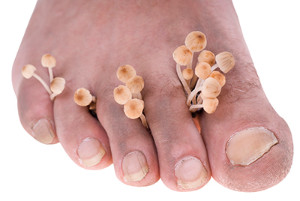 Anyone that has ever had athlete’s foot knows how much of a nuisance it is. It itches and itches and no amount of scratching will make it relent. The foot gets red, and pain can quickly ensue. Athlete’s foot is a fungus, and like most fungi, thrives in warm, moist environments. The gym is a perfect place for this fungus, so it is important to remember to wear sandals when showering after your workout. Keep your feet dry, make sure to clean them well, and change your socks daily. If your feet are prone to sweating you may have an increased risk of athlete’s foot, so double your efforts in this regard. If you do contract the disease, over the counter treatment options are available, and are quite effective.
Anyone that has ever had athlete’s foot knows how much of a nuisance it is. It itches and itches and no amount of scratching will make it relent. The foot gets red, and pain can quickly ensue. Athlete’s foot is a fungus, and like most fungi, thrives in warm, moist environments. The gym is a perfect place for this fungus, so it is important to remember to wear sandals when showering after your workout. Keep your feet dry, make sure to clean them well, and change your socks daily. If your feet are prone to sweating you may have an increased risk of athlete’s foot, so double your efforts in this regard. If you do contract the disease, over the counter treatment options are available, and are quite effective.
Athlete’s foot is an inconvenient condition that can be easily reduced with the proper treatment. If you have any concerns about your feet and ankles, contact one of our podiatrists from Dr. Kane & Associates, P.C. Our doctors will treat your foot and ankle needs.
Athlete’s Foot: The Sole Story
Athlete's foot, also known as tinea pedis, can be an extremely contagious foot infection. It is commonly contracted in public changing areas and bathrooms, dormitory style living quarters, around locker rooms and public swimming pools, or anywhere your feet often come into contact with other people.
Solutions to Combat Athlete’s Foot
- Hydrate your feet by using lotion
- Exfoliate
- Buff off nails
- Use of anti-fungal products
- Examine your feet and visit your doctor if any suspicious blisters or cuts develop
Athlete’s foot can cause many irritating symptoms such as dry and flaking skin, itching, and redness. Some more severe symptoms can include bleeding and cracked skin, intense itching and burning, and even pain when walking. In the worst cases, Athlete’s foot can cause blistering as well. Speak to your podiatrist for a better understanding of the different causes of Athlete’s foot, as well as help in determining which treatment options are best for you.
If you have any questions please feel free to contact our office located in Westland, MI.. We offer the newest diagnostic and treatment technologies for all your foot and ankle needs.
Read more about Athlete's FootAthlete's Foot a Problem at Gyms
 Anyone that has ever had athlete’s foot knows how much of a nuisance it is. It itches and itches and no amount of scratching will make it relent. The foot gets red, and pain can quickly ensue. Athlete’s foot is a fungus, and like most fungi, thrives in warm, moist environments. The gym is a perfect place for this fungus, so it is important to remember to wear sandals when showering after your workout. Keep your feet dry, make sure to clean them well, and change your socks daily. If your feet are prone to sweating you may have an increased risk of athlete’s foot, so double your efforts in this regard. If you do contract the disease, over the counter treatment options are available, and are quite effective.
Anyone that has ever had athlete’s foot knows how much of a nuisance it is. It itches and itches and no amount of scratching will make it relent. The foot gets red, and pain can quickly ensue. Athlete’s foot is a fungus, and like most fungi, thrives in warm, moist environments. The gym is a perfect place for this fungus, so it is important to remember to wear sandals when showering after your workout. Keep your feet dry, make sure to clean them well, and change your socks daily. If your feet are prone to sweating you may have an increased risk of athlete’s foot, so double your efforts in this regard. If you do contract the disease, over the counter treatment options are available, and are quite effective.
Athlete’s foot is an inconvenient condition that can be easily reduced with the proper treatment. If you have any concerns about your feet and ankles, contact one of our podiatrists from Westland Foot & Ankle Specialists, P.C.. Our doctors will treat your foot and ankle needs.
Athlete’s Foot: The Sole Story
Athlete's foot, also known as tinea pedis, can be an extremely contagious foot infection. It is commonly contracted in public changing areas and bathrooms, dormitory style living quarters, around locker rooms and public swimming pools, or anywhere your feet often come into contact with other people.
Solutions to Combat Athlete’s Foot
- Hydrate your feet by using lotion
- Exfoliate
- Buff off nails
- Use of anti-fungal products
- Examine your feet and visit your doctor if any suspicious blisters or cuts develop
Athlete’s foot can cause many irritating symptoms such as dry and flaking skin, itching, and redness. Some more severe symptoms can include bleeding and cracked skin, intense itching and burning, and even pain when walking. In the worst cases, Athlete’s foot can cause blistering as well. Speak to your podiatrist for a better understanding of the different causes of Athlete’s foot, as well as help in determining which treatment options are best for you.
If you have any questions please feel free to contact our office located in Westland, MI. . We offer the newest diagnostic and treatment technologies for all your foot and ankle needs.
What Are Plantar Warts?
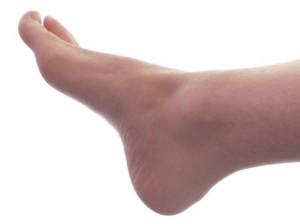 There are over 100 different varieties of HPV, or human papilloma virus. Nearly 12% of the global population have had warts at one time, and plantar warts are but one of these types. They all share one basic characteristic, they have the ability to infect skin cells. Many people, when they hear the term HPV, think that it refers to genital warts. But this is not the case, and HPV can manifest itself in many different forms. Plantar warts occur on the feet, typically on the palms or the soles. They can be flat or raised, and usually occur in dry, cracked areas of the foot. Treatments vary in scope and effectiveness. If you think you may have a plantar wart, talk to your podiatrist and go through the treatment options available.
There are over 100 different varieties of HPV, or human papilloma virus. Nearly 12% of the global population have had warts at one time, and plantar warts are but one of these types. They all share one basic characteristic, they have the ability to infect skin cells. Many people, when they hear the term HPV, think that it refers to genital warts. But this is not the case, and HPV can manifest itself in many different forms. Plantar warts occur on the feet, typically on the palms or the soles. They can be flat or raised, and usually occur in dry, cracked areas of the foot. Treatments vary in scope and effectiveness. If you think you may have a plantar wart, talk to your podiatrist and go through the treatment options available.
Plantar warts can be very uncomfortable. If you need your feet checked, contact one of our podiatrists from Dr. Kane & Associates, P.C. Our doctors will assist you with all of your foot and ankle needs.
About Plantar Warts
Plantar warts are the result of HPV, or human papillomavirus, getting into open wounds on the feet. They are mostly found on the heels or balls of the feet.
While plantar warts are generally harmless, those experiencing excessive pain or those suffering from diabetes or a compromised immune system require immediate medical care. Plantar warts are easily diagnosed, usually through scraping off a bit of rough skin or by getting a biopsy.
Symptoms
- Lesions on the bottom of your feet, usually rough and grainy
- Hard or thick callused spots
- Wart seeds, which are small clotted blood vessels that look like little black spots
- Pain, discomfort, or tenderness of your feet when walking or standing
Treatment
- Freezing
- Electric tool removal
- Laser Treatment
- Topical Creams (prescription only)
- Over-the-counter medications
To help prevent developing plantar warts, avoid walking barefoot over abrasive surfaces that can cause cuts or wounds for HPV to get into. Avoiding direct contact with other warts, as well as not picking or rubbing existing warts, can help prevent the further spread of plantar warts. However, if you think you have developed plantar warts, speak to your podiatrist. He or she can diagnose the warts on your feet and recommend the appropriate treatment options.
If you have any questions please feel free to contact our office located in Westland, MI.. We offer the newest diagnostic and treatment technologies for all your foot and ankle needs.
Read more about All About Plantar Warts